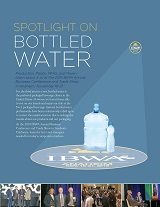A new study released last week finds that water, in all its forms, has the least environmental impact of any beverage choice. When compared to other packaged beverages, including soft drinks, sports drinks, enhanced waters and juices, bottled water has the lightest environmental footprint.
Commissioned by Nestle Waters North America, the life-cycle analysis study is believed to be the first peer-reviewed, comprehensive analysis of the environmental impact of water and alternative beverage options, including filtered and un-filtered tap water consumed from reusable plastic, steel and aluminum containers.
According to the report, packaging and distribution are key contributors to a beverage’s carbon footprint. Key findings from the study include the fact that water is the least environmentally impactful beverage option. Water of all types accounts for 41 percent of a consumer’s total beverage consumption, but represents just 12 percent of a consumer’s climate change impact.
Bottled water is the most environmentally responsible packaged drink choice. Sports drinks, enhanced waters and soda produce nearly 50 percent more carbon dioxide emissions per serving than bottled water. Juice, beer and milk produce nearly three times as many carbon dioxide emissions per serving as bottled water.
“Water is the hero in this story. If people have access to good quality tap water, we’ve always felt they should use it,” said Kim Jeffery, president and CEO of Nestle Waters North America, in a press release. “And, from a health perspective, choosing bottled water — with no calories, sweeteners or additives — is about the smartest choice one can make among packaged beverages.”



























